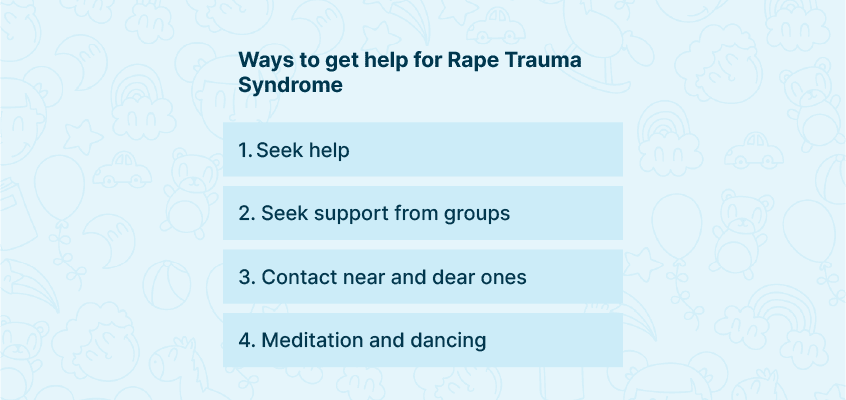Rape Trauma Syndrome is a Post Traumatic Stress Disorder (PTSD) related condition. Survivors of rapes and sexual assault often exhibit this condition.
Introduction to Rape Trauma Syndrome
Rape trauma syndrome (RTS) is a specific version of PTSD that occurs in rape, attempted rape, and sexual assaults. The survivors may feel helpless and experience multiple symptoms. These symptoms may last for months after the incident, occurring in different stages.
Let us understand further.

Our Wellness Programs
What is Rape Trauma Syndrome?
As mentioned above, survivors of sexual crimes have PTSD that manifests as RTS. A victim may frequently feel triggers in different stages:
- Acute stage
- Outward adjustment stage
- Resolution or integration stage
Let us understand the various stages of RTS.
1.Acute stage
In this stage, a person may experience:
- Numbness
- Nausea
- Vomiting
- Dizziness
- Confusion
- Depression
- Self-harm thoughts
- Poor cognitive function
They may feel impure and continuously wash themselves to feel cleaner. Hypersensitivity and lack of clarity are defining features of this stage.
One can broadly classify the acute phase into three feelings: expressed, controlled, and shocked.
- In the expressed part, the victim is constantly distraught and emotional.
- In the controlled response of the acute stage, a person pretends that everything is ok and routine, and they are too scared to express those things are not alright.
- In the shocked phase, the person feels shocked and has no recollection of the incident.
2. Outward adjustment stage
In this phase, the victim is not as affected and traumatised as seen in the acute state. There is some progress in what the person is feeling. They try to normalise whatever happened or blame themselves and try to move ahead.
They may appear all right, but in multiple cases, looks are deceiving, and the victim is not alright. Likewise, they simply try to justify the incident, move away, and find new coping techniques.
3. Resolution and integration stage
In the third state, which is the resolution or integration stage, the victim has come to terms with the incident of the sexual assault. They make every effort to move ahead.
This stage progresses from the second stage. The efforts in this stage are of great intensity, and the victim tries to take new roles, change relationships, and move ahead at a faster pace.
It is essential to understand that none of these stages is linear, and the person may experience a relapse at any stage.
Looking for services related to this subject? Get in touch with these experts today!!
Experts

Kirti Bajpai

India
Psychologist
Experience: 5 years

Mansi Chawla

India
Psychologist
Experience: 12 years

Sapna Zarwal

India
Psychologist
Experience: 19 years

Tulika Chandra

India
Psychologist
Experience: 10 years

SEEMA TANEJA

India
Psychologist
Experience: 30 years
How does Rape Trauma Syndrome affect victims?
Rape trauma syndrome can cause severe distress for victims. They may have recurring dreams about the incident and have flashbacks. They may not stop remembering the incident, and it will be etched in their memory forever. Frequent episodes cause an inability to focus and remember other things.
The victims may also face withdrawal and isolation. They may steer clear of conversation, stop talking to family and friends, and feel very alone. They may also experience numbing.
The victims may also start avoiding behaviour and actions. They may try to avoid feeling anything and stay away from anything.
The long-term effects of Rape Trauma Syndrome
It is often very overwhelming, and the victim may face:
- Phobias
2 Suicidal thoughts
- Depression
- Shame
- of assault
- Fear
- Anger
- Lack of concentration
- Memory loss
- Sexual dysfunction
- Rationalization and self-blame
- Isolation, helplessness, and anxiety.
The person may be scared of getting intimate and becomes fearful of relationships. The symptoms, such as depression, anxiety, and suicidal thoughts, can be seen as mental illnesses if left undiagnosed.
One may also experience severe mood swings, hypervigilance, and anorexia. There is a loss of appetite, or there are cases of compulsive eating.
How to deal with PTSD after rape or sexual assault?
Recovering from rape trauma syndrome takes time, and the healing process is never linear. It is difficult for the survivor to understand and accept what happened, take control of things, work on themselves, and heal.
The aftermath of the incident is bone-shattering, and it will leave the survivor constantly riddled with flashbacks and bad memories. Everything will feel unsafe, and they may try to rationalise and blame themselves. It is vital to be compassionate and accepting to understand it is not their fault.
It is indispensable for survivors to seek help and heal themselves from what happened. The recovery is indeed a difficult journey. They may experience different stages repeatedly, but they must understand what happened was out of their control and be kind towards themselves. They have to rebuild their confidence little by little.
Ways to get help for Rape Trauma Syndrome
Here are some tips to assist those suffering from RTS.
1.Seek help
PTSD after the rape or sexual assault is very triggering. Seeking help through therapy is a beautiful way of dealing with PTSD after sexual assault.
Find the trauma therapist who has previous experience working with people who have faced sexual assault. A credible therapist will help the survivor go through different RTS stages with support and move away from distressing times.
2. Seek support from groups
Seeking out support from different support groups for sexual assault survivors can be a good choice. It brings like-minded people together and helps one understand the victims’ different situations.
3. Contact near and dear ones
It is essential to fall back on one’s support system and tell them what one is feeling. Contacting near and dear ones is a good idea as they will provide much-needed support and lend a listening ear.
4. Meditation and dancing
Rhythmic movements such as a dance can be beneficial, and one may feel better relaxation and control. It also helps release endorphins in the brain, necessary for dealing with different mood swings. Meditation is another way of focusing on the self and centring it in the present moment.
Conclusion and suggestions for further reading
Rape trauma syndrome is complex, and experiencing the different stages can be very stressful. It is essential to understand and prepare oneself for the triggers and set upon on the journey of healing.
To handle RTS, seeking support and being compassionate towards oneself is necessary. This approach is crucial to reconnect to one’s body and feelings in the long run.


















